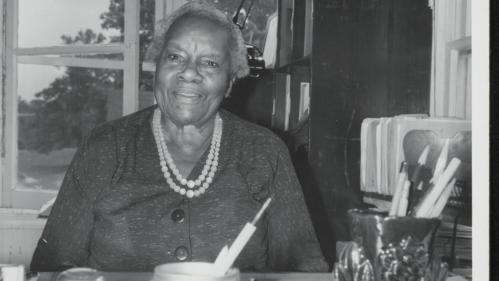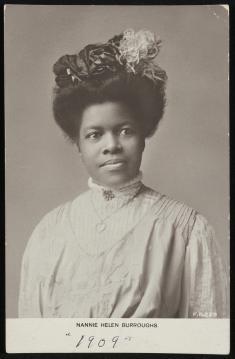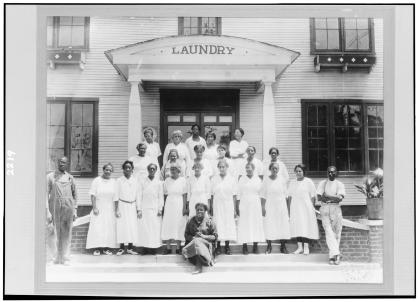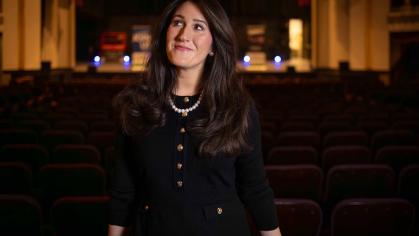New Book Tells the Story of the Most Influential Black Woman You’ve Never Heard Of

Danielle Phillips-Cunningham is working to make Nannie Helen Burroughs a household name
Nannie Helen Burroughs is rarely mentioned in the same breath as Rosa Parks, Fannie Lou Hamer, and other luminaries of the civil rights movement, but her achievements still resonate more than a century later.
Burroughs, the daughter of former slaves, established her own school in Washington, D.C. in 1909, helping to forge new career pathways for Black women at a time when white society – and some Black men – gave them few options.
She later founded a labor organization to improve pay and working conditions for Black women. She also fought for women’s voting rights, directed a presidential commission on housing, and even found time to write several plays before her death in 1961.
Danielle Phillips-Cunningham, an associate professor in the School of Management and Labor Relations, explores this formidable legacy in her new book, Nannie Helen Burroughs: A Tower of Strength in the Labor World, published this week by Georgetown University Press.
Rutgers Today talked with Phillips-Cunningham about Burroughs’ accomplishments and how the rights she fought for are being threatened today.

Why was Burroughs’ school so significant?
In the early 20th century, Black women were excluded from many occupations because of their race and gender. They often turned to sharecropping or domestic work—cleaning homes, cooking, and caring for children—to get by.
When Burroughs founded the National Training School for Women and Girls, she designed a unique curriculum to reform domestic work and challenge discrimination, with the goal of creating new job opportunities for her students. It was not easy. Many people, including Booker T. Washington, opposed what she was trying to accomplish. But she pushed ahead.
During the Great Migration, hundreds of Black women and girls migrated to Washington from the Caribbean, Africa, and across the United States to attend Burroughs’ school. Many of them went on to become horticulturalists, teachers, entrepreneurs, and even performers. Ethel Moses, one of the most famous Black actresses of the 1930s, was a graduate.
It’s also noteworthy that NTS was the only school in the country that required students to study Black history in order to graduate, and it was the only school outside of the Deep South established and managed by Black women.
What prompted Burroughs to establish a labor organization?
Domestic work was the lowest-paying and least-regulated occupation for women. Burroughs started the National Association of Wage Earners in the hope of raising pay and improving working conditions.
Members received employment assistance, job training, housing, and became member-owners of a profit-sharing enterprise. Their constitution included a strike clause for when employers did not adhere to NAWE employment contracts.
Beauticians, sharecroppers, pastors, teachers, insurance agents, college presidents, mayors and others joined the NAWE to show their solidarity with domestic workers.

Despite all she accomplished, Burroughs isn’t as widely known as other civil rights leaders. Why is that?
As a school president and community organizer, Burroughs did not have time to write an autobiography. In addition, traditionally, men have been considered the most important historical figures. Burroughs is not unlike many pioneering Black women leaders with whom she worked and whose stories have only come to light within the past four decades thanks to women scholars.
The public is now becoming more familiar with the work of Mary McLeod Bethune, Mary Church Terrell, and Anna Julia Cooper. It is time that the world also learns what Burroughs did to establish a foundation for labor, civil, and women’s rights.
Your book is coming out at a time of political upheaval. What lessons do you take from Burroughs that are helpful today?
President Trump’s executive orders to end birthright citizenship and protections against employment discrimination are clear demonstrations of the administration’s plans to restore Jim Crow. Burroughs showed us how everyday movement-building work can restore the rights that we’re losing—rights that are fundamental to our everyday lives.
Burroughs engaged in daily and unglamorous organizing work that would not have resulted in several hundred likes on TikTok and Instagram, but her efforts were critical to establishing a foundation for the Civil Rights Act of 1964 and Voting Rights Act of 1965.
Listen to Danielle Phillips-Cunningham’s full interview about Nannie Helen Burroughs on the School of Management and Labor Relations’ podcast, A Third of Your Life.




